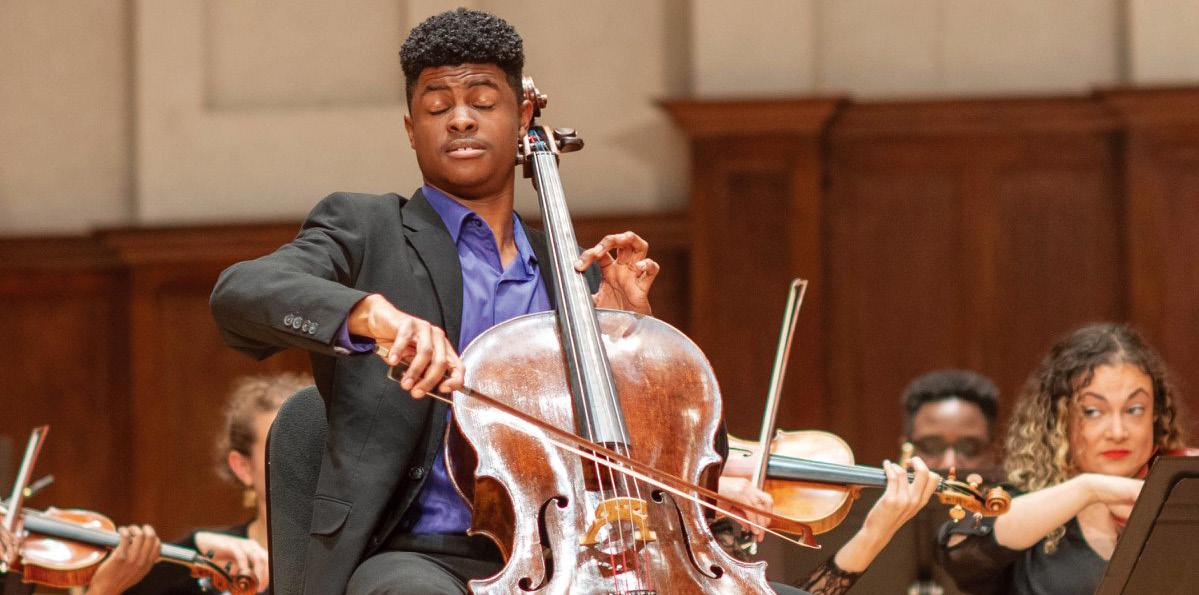
18 minute read
The Score
NEWS, MOVES, AND EVENTS IN THE ORCHESTRA INDUSTRY
The New York Philharmonic performs Handel’s Messiah at the Riverside Church in New York City, December 2021.
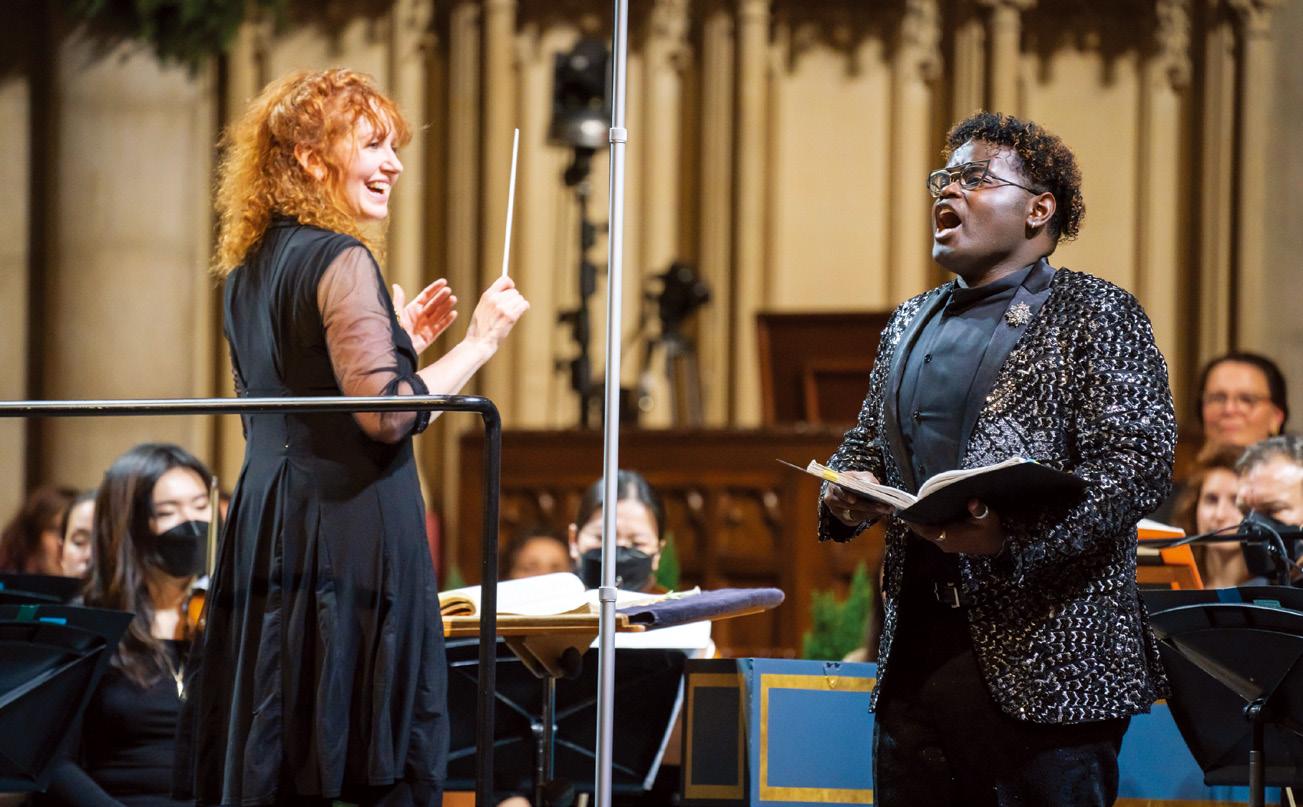
Conductor Jeanette Sorrell and countertenor John Holiday at a New York Philharmonic performance of Handel’s Messiah, December 2021. Orchestras had to forego seasonal performances of Handel’s Messiah in December 2020 due to the pandemic. Grateful audiences returned this December for a brief flowering of Messiahs around the country, following the implementation of vaccine and mask requirements for singers, musicians, and audiences—just prior to the arrival of the virus’s Omicron variant. Among orchestras performing Messiah were the Knox-Galesburg Symphony in Illinois, the Erie Philharmonic and Johnstown Symphony in Pennsylvania, the Milwaukee Symphony Orchestra, and the National Symphony Orchestra in Washington, D.C. At New York City’s Riverside Church, the New York Philharmonic and singers from the period-instrument ensemble Apollo’s Fire performed Messiah led by Jeannette Sorrell, artistic director of Apollo’s Fire. Leading up to Messiah, the Philharmonic and John Jay College of Criminal Justice co-presented “The Unanswered Questions: Handel and the Royal African Company,” a discussion exploring whether or how to separate a work of art from the morality of its creator, given Handel’s investments in the transatlantic slave trade. Panelists included Handel scholar and professor emeritus at MIT Ellen Harris; ethnomusicologist and Juilliard professor Fredara Hadley; composer, vocalist, and librettist Imani Uzuri; and Philharmonic Vice President of Artistic Planning Patrick Castillo. WQXR’s Terrance McKnight moderated. “The Unanswered Questions” series was launched in October with a conversation on how and why artists and institutions address issues in the criminal justice system, complementing Philharmonic performances of Anthony Davis’s You Have the Right to Remain Silent.
OMICRON IMPACT
Live, in-person concerts began to resume this fall, as declining COVID-19 infection rates and the growing acceptance of precautionary measures such as vaccine and mask mandates meant that the orchestra scene could start to get back to sort-of normal. In early December, a new coronavirus variant, Omicron—fast-spreading though apparently less lethal—emerged and quickly went global. By late December, sharp spikes in COVID infections caused orchestras, concert halls, and performing arts centers to announce postponements, cancellations, and artist substitutions. The information in this issue of Symphony is correct as of press time, but the pandemic continues to evolve, with new developments and scientific findings that affect orchestras and their audiences virtually every day. The League of American Orchestras’ website, americanorchestras.org/, offers resources concerning the COVID-19 guidance that federal agencies have prepared for employers, community-based organizations, and hosts of large gatherings. Some resources are in the form of recommendations, while others are mandatory rules. The Occupational Safety and Health Administration (OSHA), Department of Labor, and the Equal Employment Opportunity Commission (EEOC) have issued details of the legal requirements for employers throughout the pandemic. The Centers for Disease Control and Prevention (CDC) issue guidance to help businesses and employers contain the spread of the coronavirus. The World Health Organization (WHO) maintains updated guidance on mass gatherings, situation reports, and global research. Learn more at https://americanorchestras.org/learn/covid-19/cdc-coronavirus-planning-guides/.
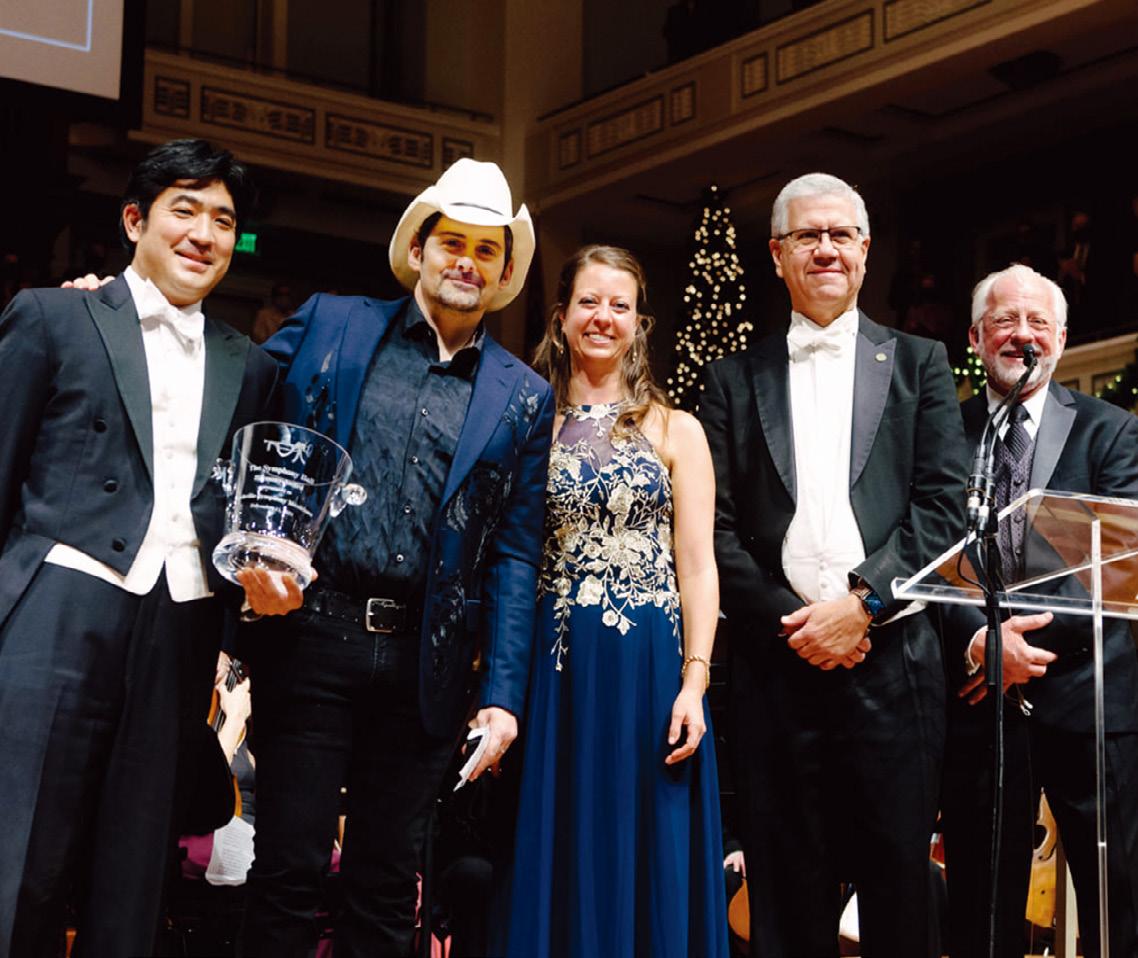
Brad Paisley (in cowboy hat) presents the 2021 Harmony Award to the musicians of the Nashville Symphony. Representing the musicians are, left to right, concertmaster Jun Iwasaki, violinist Johna Smith, and tuba player Gil Long. At far right is Nashville Symphony President and CEO Alan D. Valentine. In December, the Nashville Symphony celebrated 75 years with an anniversary concert at Schermerhorn Symphony Center led by Principal Pops Conductor Enrico Lopez-Yañez. The event, which raised $1 million for the orchestra’s free music education programs throughout middle Tennessee, featured violinist Itzhak Perlman and the orchestra in Beethoven’s Violin Concerto and spotlighted three living American composers: Carlos Simon (The Block), Joan Tower (Made in America), and Kenji Bunch (Groovebox Fantasy). The Tower work was featured on a Nashville Symphony recording that won multiple 2008 Grammy Awards. Perhaps most significantly in this difficult pandemic year, the Nashville Symphony musicians were given the orchestra’s annual Harmony Award at the event for their perseverance in the face of major challenges. The award, typically awarded to an individual who embodies “the harmonious spirit of Nashville’s musical community,” was presented to the musicians by country music singer/songwriter Brad Paisley, recipient of the orchestra’s 2013 Harmony Award.
Nathalie Stutzmann, Atlanta Symphony’s Next Music Director
In October, the Atlanta Symphony Orchestra made history when it announced that Nathalie Stutzmann (right) has been appointed as its next music director— the first woman to serve in that role at the ASO. This fall, she will succeed Robert Spano, the orchestra’s music director from 2001 to 2021. Stutzmann, a native of France, is also currently the Philadelphia Orchestra’s principal guest conductor and chief conductor of Norway’s Kristiansand Symphony Orchestra. She made her first appearance in Atlanta as music director designate in October, when she conducted music by Tchaikovsky, Verdi, and Missy Mazzoli. In March 2022, she will conduct the ASO in Strauss’s Death and Transfiguration and Mozart’s Requiem, also featuring the ASO chorus. Stutzmann has had a distinguished career as a contralto, and also studied piano, bassoon, and cello. Stutzmann studied conducting with Finland’s Jorma Panula and was mentored by Seiji Ozawa and Simon Rattle. Stutzmann’s future conducting dates include the Minnesota Orchestra, Pittsburgh Symphony, San Francisco Symphony, Orchestre de Paris, Royal Stockholm Philharmonic, London Symphony Orchestra, Vienna Symphony, Hamburg NDR Elbphilharmonie Orchestra, Oslo Philharmonic, Helsinki Radio Symphony, and Brussels’s La Monnaie.
Brice Toul
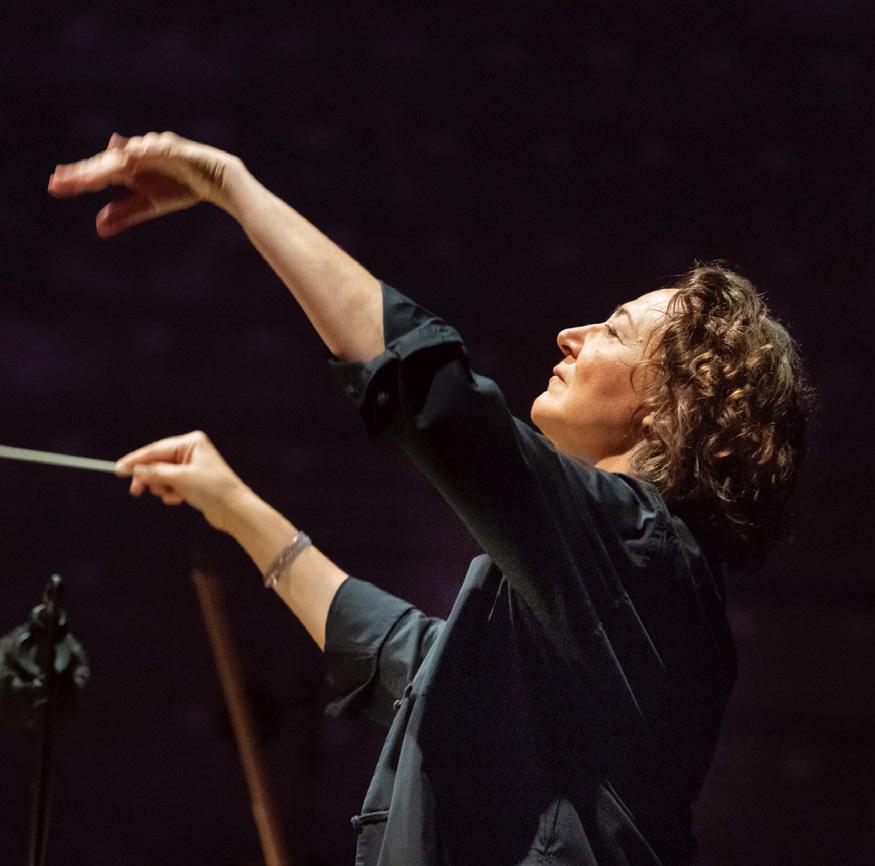
Symphony Magazine Article Wins Award
“Anti-Black Discrimination in American Orchestras,” an article published by Symphony magazine and written by Aaron Flagg, won an ASCAP Foundation Deems Taylor/Virgil Thomson Award for an article in the concert music field. Published in Symphony’s Summer 2020 Issue, the article is a sweeping examination of the orchestra field’s historic and ongoing lack of ethnic and racial diversity, particularly as pertains to Black artists, board members, and administrators, and proposes steps to improve equity and inclusion. Aaron Flagg is the chair and associate director of Jazz Studies at the Juilliard School, a member of the League of American Orchestras’ Board of Directors (where he is secretary), and chair of the League’s Equity, Diversity, and Inclusion Committee. Announced in October, ASCAP Foundation Deems Taylor/Virgil Thomson awards for pieces in the music criticism and pop music categories also went to The New York Times and City Journal. Read “Anti-Black Discrimination in American Orchestras” at https://americanorchestras.org/anti-black-discrimination-in-american-orchestras/.

Students test the 200-seat Barbro Osher Recital Hall at the San Francisco Conservatory’s new Bowes Center, scheduled to open to the public in February. Yo-Yo Ma performs at Barbro Osher Recital Hall in the San Francisco Conservatory’s newly opened Bowes Center.
Up in San Francisco
Associated Press

The San Francisco Conservatory of Music opened its new Bowes Center for Performing Arts to students this fall. Located across from Davies Hall, home of the San Francisco Symphony, the 12-story structure includes classrooms, student and public housing, a recording studio, and performance spaces. The 170,000-square-foot Bowes Center, designed by Mark Cavagnero Associates, effectively doubles the school’s space. It is within walking distance of SFCM’s Ann Getty Center, the Conservatory’s home since 2006. The building also includes 27 rent-stabilized apartments, which upgrade and replace units from the site’s previous building for its prior tenants. The three performance spaces are the Cha Chi Ming Recital Hall on the ground floor; the 200-seat Barbro Osher Recital Hall on the eleventh floor, overlooking Civic Center; and the black-box Technology Hall. The building includes offices for faculty, staff of Opus 3 Artists, and broadcasting facilities for KDFC Classical Radio. The building is set to open to the public in February, and the Conservatory says most performances will be free.

Boston Youth Symphony Orchestra.
Youth to the Fore
Lima Symphony
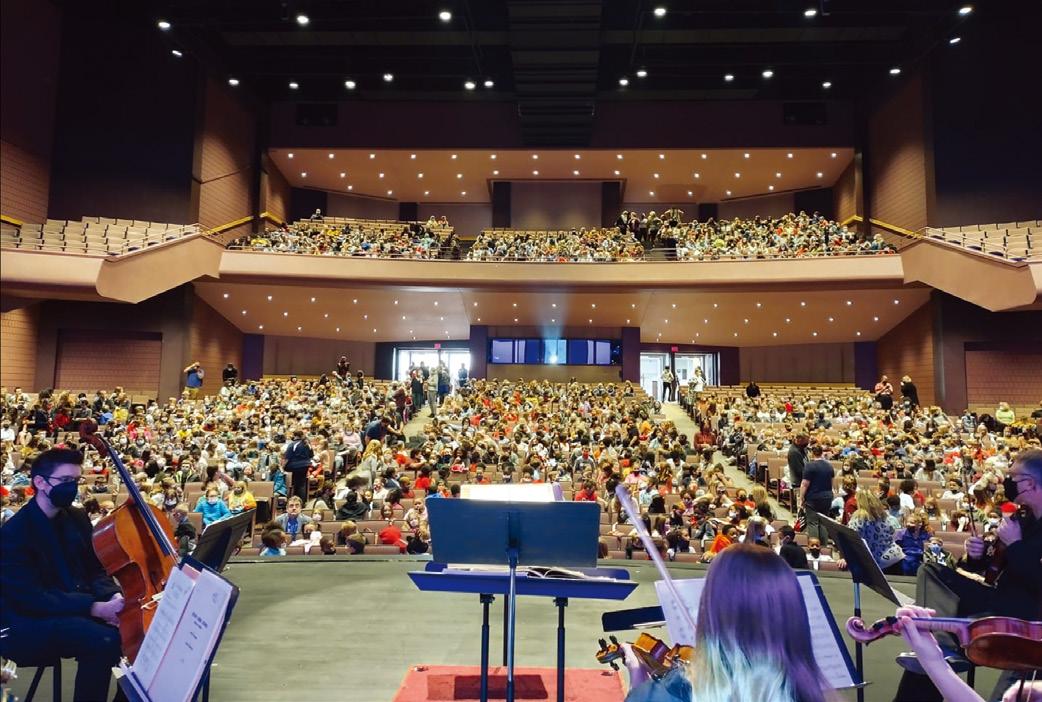
Students attend a Lima Symphony Orchestra concert.
It has been a tough year for young musicians to perform and rehearse together, due to the pandemic. In 2020-21, the Boston Youth Symphony Orchestra presented a virtual version of Prokofiev’s Peter and the Wolf on YouTube, in place of its annual Peter and the Wolf at Symphony Hall. This fall, the BYSO began rehearsing in person with Music Director Federico Cortese (above left), and in November they returned to Symphony Hall, live and in person, for Peter and the Wolf, led by Cortese and narrated by Genevieve Lefevre, a 2020 Harvard College graduate and previous BYSO violist. All audience members were required to present proof of vaccination or a negative COVID-19 test, and CDC-approved masks were mandatory. In Ohio, schoolchildren filled Lima’s Crouse Performance Hall this fall (above right) for the Lima Symphony Orchestra’s “M is for Music,” a young people’s concert in which Music Director Andrew Crust and actress Mary Jane Pories introduced students to classical music. “You see the kids come in, and they don’t know what to expect,” said Lima Symphony Executive Director Elizabeth Brown-Ellis. “But they’re up and dancing, they’re hearing music that they recognize, and music that makes them feel something, and they just love it.”
Some of today’s most exciting orchestral music is premiering onscreen, with scores by composers whose influences range from classical to hip-hop, rock, jazz, and experimental music. In November at Walt Disney Concert Hall, the Los Angeles Philharmonic presented “Reel Change: The New Era of Film Music,” a series of concerts curated by film, television, and video game composers Kris Bowers, Nicholas Britell, and Hildur Guðnadóttir. Guðnadóttir’s program featured her own music from Joker and Battlefield 2042, plus music by Ryuichi Sakamoto, Alvin Lucier, Kaija Saariaho, Mica Levi, Henryk Górecki, Arvo Pärt, and György Ligeti that was used in films. Bowers’s program featured music from his scores for King Richard, Green Book, When They See Us, and Bridgerton, plus a world-premiere Horn Concerto, with Andrew Bain; Bowers’s program also included music by Shigeru Umebayashi, Owen Pallett, Arcade Fire, Björk, Jason Moran, and John Brion. In addition to music from his scores for Vice, The Underground Railroad, If Beale Street Could Talk, and Don’t Look Up, Britell’s program included music from Jackie (Mica Levi), Mr. Turner (Gary Yershon), Malcolm X (Terence Blanchard), and There Will Be Blood (Jonny Greenwood).
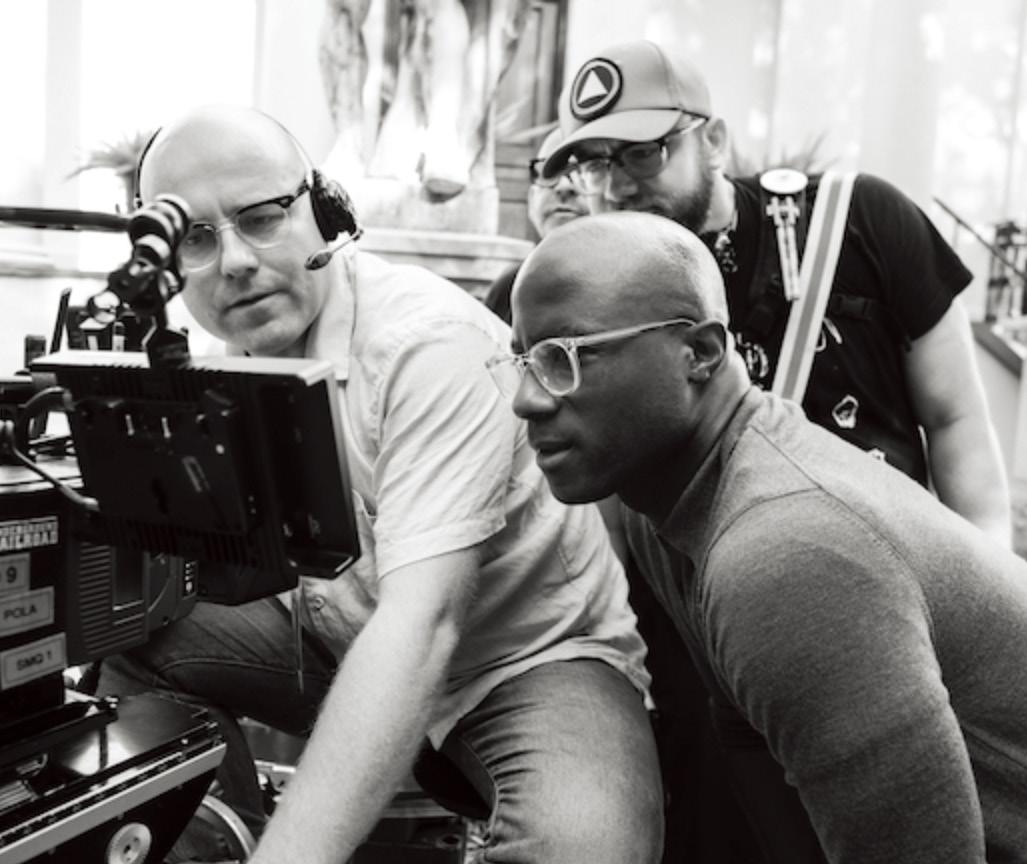
Kyle Kaplan and Atsushi Nishijima / Amazon Studios
Cinematographer James Laxton and director Barry Jenkins on the set of The Underground Railroad, which has a score by Nicholas Britell. Film scores by Britell and other contemporary composers were recently featured by the Los Angeles Philharmonic.
GOOGLING EDMOND DÉDÉ
On November 20, Google marked the 194th birthday of Black Creole violinist, conductor, and composer Edmond Dédé (1827-1901) by replacing its homepage logo with a “Doodle” in his honor. On the Google Doodle page, Kyle Bradshaw notes that the artwork was commissioned from Haitian-American artist Lyne Lucien, and “depicts Edmond Dédé conducting an orchestra, with a violin and clarinet behind him.” Born in New Orleans as the son of a bandleader, Dédé was a young violin prodigy. But with few opportunities as a Black musician in the United States, he left to study at the Paris Conservatory, later moving to Bordeaux, where he established himself as a conductor at the Grand Theatre. The ballets, operettas, overtures, and songs he composed were popular in France but gained little traction in his home country. Google reports that many of his compositions are preserved in Paris’s Bibliothèque Nationale and U.S. universities.
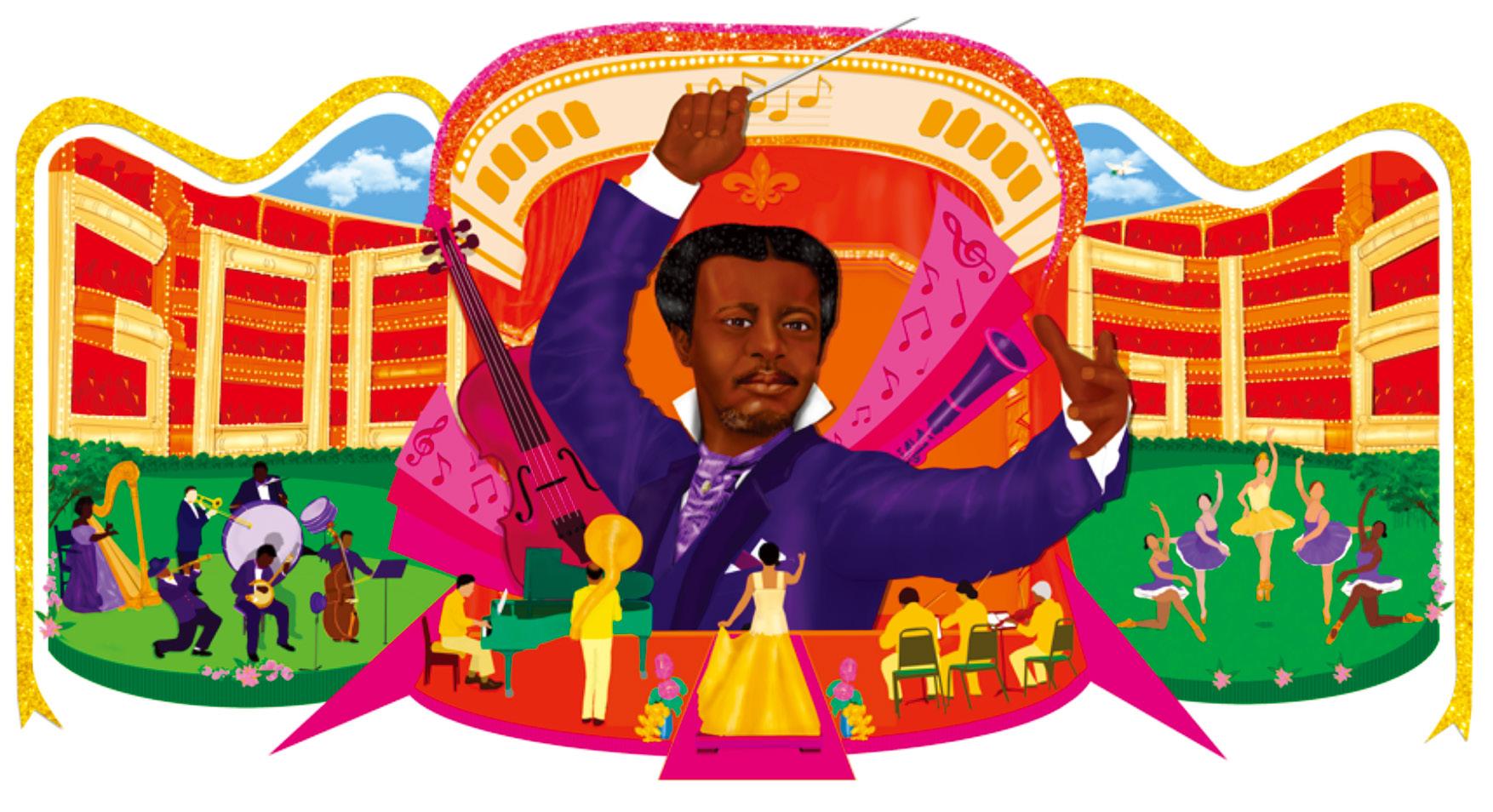
Playing in Peoria
In November, the Peoria Symphony Orchestra presented HerStory: A Musical Tribute to Betty Friedan, a concert marking the 100th birthday of Betty Friedan, born in 1921 in Peoria, Illinois. Friedan was best known as author of The Feminine Mystique and co-founder of the National Organization for Women. The centerpiece of HerStory was the world premiere of PSO composer in residence Stephanie Ann Boyd’s Everywoman: A Friedan Centennial Memoire, which tracked Friedan’s “personal triumphs and tribulations … from her college-age musings to the world-changing victories in her call for equality.” Everywoman was narrated by Deborah F. Rutter, president of the John F. Kennedy Center for the Performing Arts in Washington, D.C.; events leading up to the concert included a screening of 28 Minutes with Betty Friedan, a 1999 interview in which Friedan discussed her upbringing in Peoria, and a “Lunch and Learn” conversation with Boyd, Music Director George Stelluto, and violinist Sirena Huang, soloist in Boyd’s Sybil violin concerto on the same program. To cap it all off, Peoria Mayor Rita Ali and the City Council issued a proclamation recognizing the orchestra’s Friedan commission.
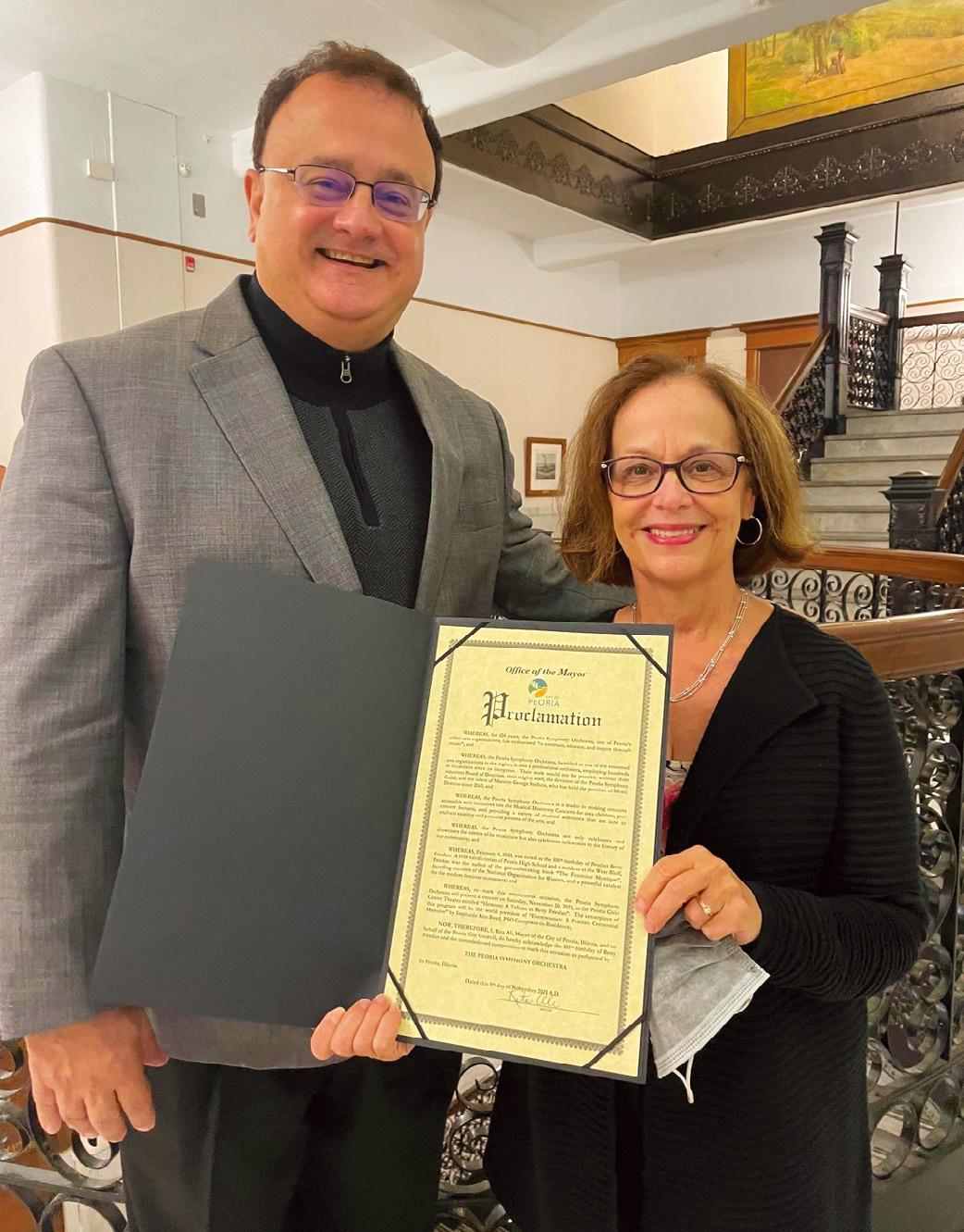
Peoria Symphony Orchestra Music Director George Stelluto and Executive Director Susan Hoffman hold a proclamation by the City of Peoria recognizing the orchestra for its Everywoman: A Friedan Centennial Memoire commission.
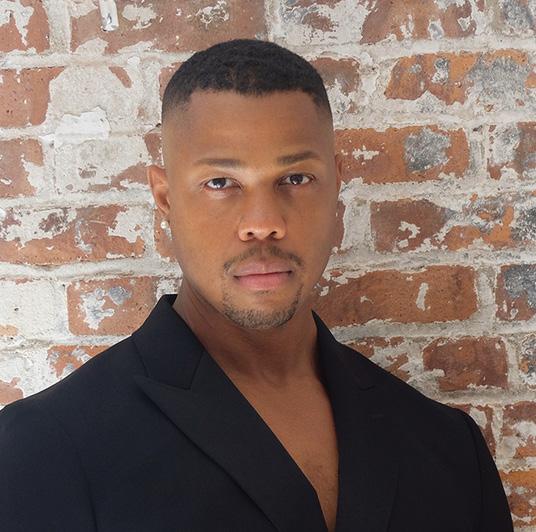

J us t in Pu m f r e y / D ecca C h r i s W i t z k e Ca r o l i n e T o m pk i ns Ka d e e m J oh nson
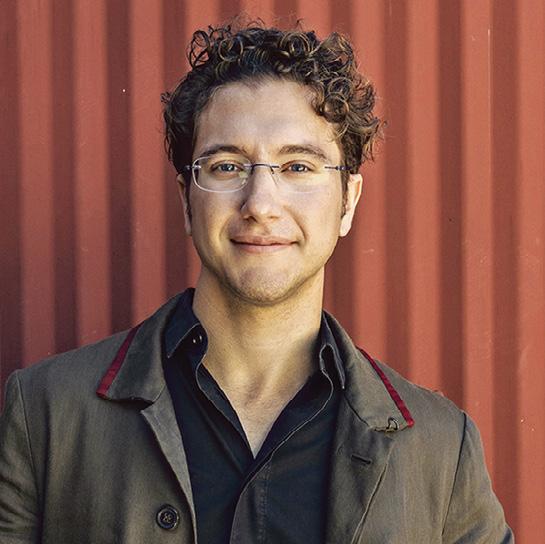
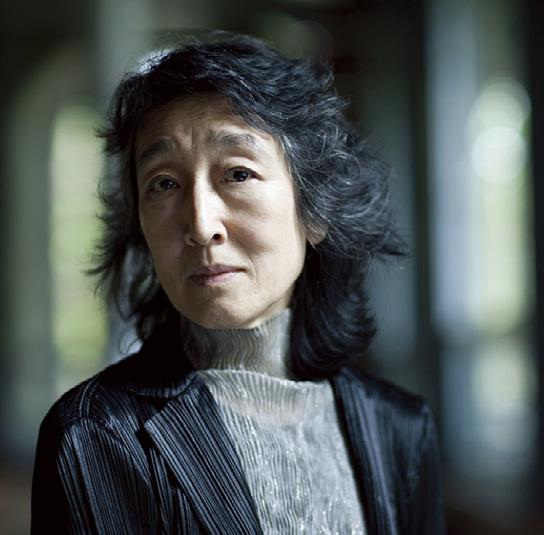
Musical America honorees Mitsuko Uchida, Teddy Abrams, Missy Mazzoli, and Davóne Tines.
Musical America’s 2022 Awardees: Uchida, Abrams, Mazzoli, Tines
Pianist Mitsuko Uchida has been named 2022 Artist of the Year by Musical America, publisher of the annual International Directory for the Performing Arts, edited by Clive Paget, and of the daily Musical America news site, edited by Susan Elliott. Also receiving awards in other categories were Teddy Abrams, music director of the Louisville Orchestra (Conductor of the Year); Missy Mazzoli (Composer of the Year); and bass-baritone Davóne Tines (Vocalist of the Year). As was the case last year, the awardees participated in a ceremony that took place online, due to the pandemic. Paget hosted the December 5 Facebook Live ceremony, during which each awardee was interviewed by a friend or colleague; interviewers included composer John Adams (Abrams); violinist Jennifer Koh (Mazzoli); opera director Yuval Sharon (Tines); and pianist Jonathan Biss (Uchida).
Pennsylvania’s Johnstown Symphony Orchestra has elected MARK ADDLEMAN to serve as board president for a two-year term. ANTHONY C. BALL has been named executive director of the New York City-based Little Orchestra Society, succeeding Joanne Bernstein-Cohen, who died in August. The Wichita Symphony Orchestra in Kansas has appointed RYAN BEEKEN as director of the Wichita Symphony Chorus. The Evansville Philharmonic Orchestra in Indiana has appointed MACKENZIE BRAUNS as principal bassoon, MICHAEL CHU as principal second violin, and REBECCA SALO as principal horn. SARAH CALDERINI has been hired as the Ann Arbor Symphony Orchestra’s executive director. The New Jersey Symphony Orchestra has appointed TONG CHEN as assistant conductor. VICTORIA CHUNG has joined Virginia’s Richmond Symphony as principal oboe. JUSTIN CUMMINGS has been selected as the Knoxville Symphony’s principal bassoon. DEVAN JAQUEZ is the orchestra’s new principal flute. The Fort Worth Symphony Orchestra has named KEVIN JOHN EDUSEI principal guest conductor, effective with the 2022-23 season. ANNE EWERS will retire as president and CEO of Philadelphia’s Kimmel Center in June. This fall, the Kimmel Center and Philadelphia Orchestra became one organization, headed by orchestra President and CEO Matías Tarnopolsky. ADAM HANNA has joined the Oklahoma City Philharmonic as principal trombone. The Venice Symphony in Florida has appointed JESSICA HUNG associate concertmaster. The Pittsburgh Symphony Orchestra has named JACOB JOYCE and MOON DOH to two-year terms as assistant conductors. WELZ KAUFMANN has been appointed as managing director of Arizona’s True Concord Voices and Orchestra; Kaufmann retired as president and CEO of Illinois’ Ravinia Festival in 2020.
California’s Sacramento Philharmonic and Opera has selected GIULIANO KORNBERG as executive director, effective in February. He has been serving as the organization’s chief revenue and development officer. Cincinnati Symphony Orchestra Music Director LOUIS LANGRÉE has been named director of the Opéra-Comique in Paris. He will retain his music director posts in Cincinnati (through 2024) and at the Mostly Mozart Festival in New York City. Chamber Music America has named KEVIN KWAN LOUCKS as chief executive officer, succeeding Margaret M. Lioi, who is retiring. Early Music America has selected DAVID McCORMICK as executive director, succeeding Karin Brookes. ROBERT NEU has joined Utah Symphony | Utah Opera as vice president of artistic planning. The Louisville Orchestra has hired GRAHAM PARKER as interim executive director. ANTHONY PARNTHER, music director of California’s San Bernardino Symphony, will conduct the Gateways Music Festival Orchestra at its Carnegie Hall debut in April, replacing the late Michael Morgan. Indiana’s Carmel Symphony Orchestra has selected CARA PITTENGER, a percussionist, as its new executive director. The Pierre Monteux Memorial Foundation has named STAN RENARD as executive director of the Monteux School and Music Festival in Hancock, Maine, effective with the 2022 season. Florida’s Jacksonville Symphony has appointed MARIANNE RICE, its director of music education and community engagement, to the newly created position of vice president of education and diversity, equity, and inclusion initiatives. Missouri’s Kansas City Symphony has named JOHN ROLOFF as its chief operations officer. ERIK RÖNMARK has been named president and CEO of the Detroit Symphony Orchestra, succeeding Anne Parsons, who previously announced she is retiring. Florida’s Tallahassee Symphony Orchestra has appointed MARY SAATHOFF as its inaugural director of philanthropy. Oregon’s Britt Festival Orchestra has hired RENIA SHTERENBERG as general manager. The Western Piedmont Symphony in North Carolina has appointed KELLY SWINDELL as executive director. The Rhode Island Philharmonic Orchestra and Music School has named BRAMWELL TOVEY principal conductor and artistic director; he has been serving since September 2018 as artistic advisor and conductor. JAMES O. WELSCH has been appointed music director and symphonic orchestra conductor for the Florida Symphony Youth Orchestras. Indiana’s Fort Wayne Philharmonic has named current Associate Conductor CALEB YOUNG to the newly created position of guest conductor for engagement.
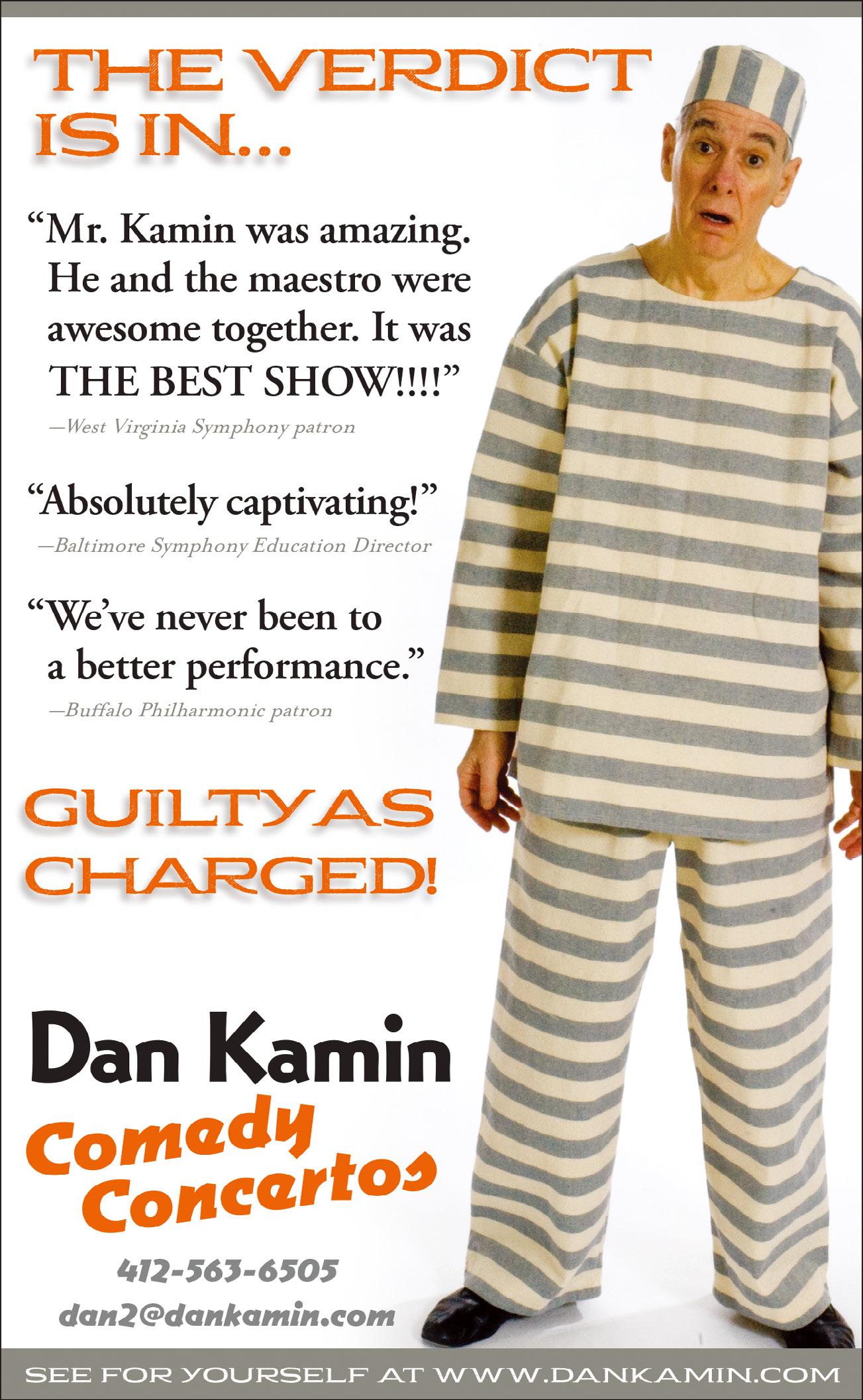

The Boston Modern Orchestra Project and Artistic Director Gil Rose during a recording session in Mechanics Hall in Worcester, Massachusetts.
Boston Modern Orchestra Project, perhaps best known for commissioning and recording music by living composers, has announced a new initiative with the Boston-based Odyssey Opera company: “As Told By: History, Race, and Justice on the Opera Stage,” a five-year series of performances of operas by Black composers. Gil Rose is artistic director of both organizations. The series will launch in June 2022 with the New England premiere of Anthony Davis’s 1986 opera X: The Life and Times of Malcolm X, with bass-baritone Davóne Tines in the title role. Also planned are performances in 2023, 2024, and 2025, respectively, of Nkeiru Okoye’s 2014 Harriet Tubman: When I Crossed That Line to Freedom, William Grant Still’s 1949 Troubled Island, about Haitian revolutionary Jean-Jacques Dessalines, and Ulysses Kay’s 1991 Frederick Douglass. In 2026, BMOP and Odyssey Opera will perform the commissioned world premiere of an opera by Jonathan Bailey Holland about Martin Luther King Jr.’s years in Boston, framed by the journey to Selma, Alabama. The initiative will encompass recordings on BMOP’s record label, BMOP/sound, and education programs in partnership with Castle of Our Skins, the Boston-based organization dedicated to celebrating Black artistry through music.
Symphony Hall Express
Holiday concerts, a December tradition for many orchestras, were greatly missed by audiences in 2020, when most of them were put on hold due to the pandemic. Keith Lockhart and the Boston Pops Orchestra returned to Symphony Hall in December 2021 for three weeks of holiday concerts. Music included Duke Ellington’s version of Tchaikovsky’s Nutcracker Suite, Mexican Christmas songs by Silvino Jaramillo, a medley of holiday spirituals, and seasonal songs signaling the arrival of Santa at Symphony Hall. Seven matinees for children featured music from Dr. Seuss’s How the Grinch Stole Christmas. Highlights included the Tanglewood Festival Chorus returning after a two-year hiatus from performing as an ensemble to present favorites such as the “Hallelujah” Chorus, and a sensoryfriendly holiday concert was given for people on the autism spectrum and their families. At all concerts, masks and proof of full vaccination or a negative COVID test were required.
Winslow Townson

Keith Lockhart and the Boston Pops at Symphony Hall in December 2021, where holiday pops concerts—and Santa—returned this year.
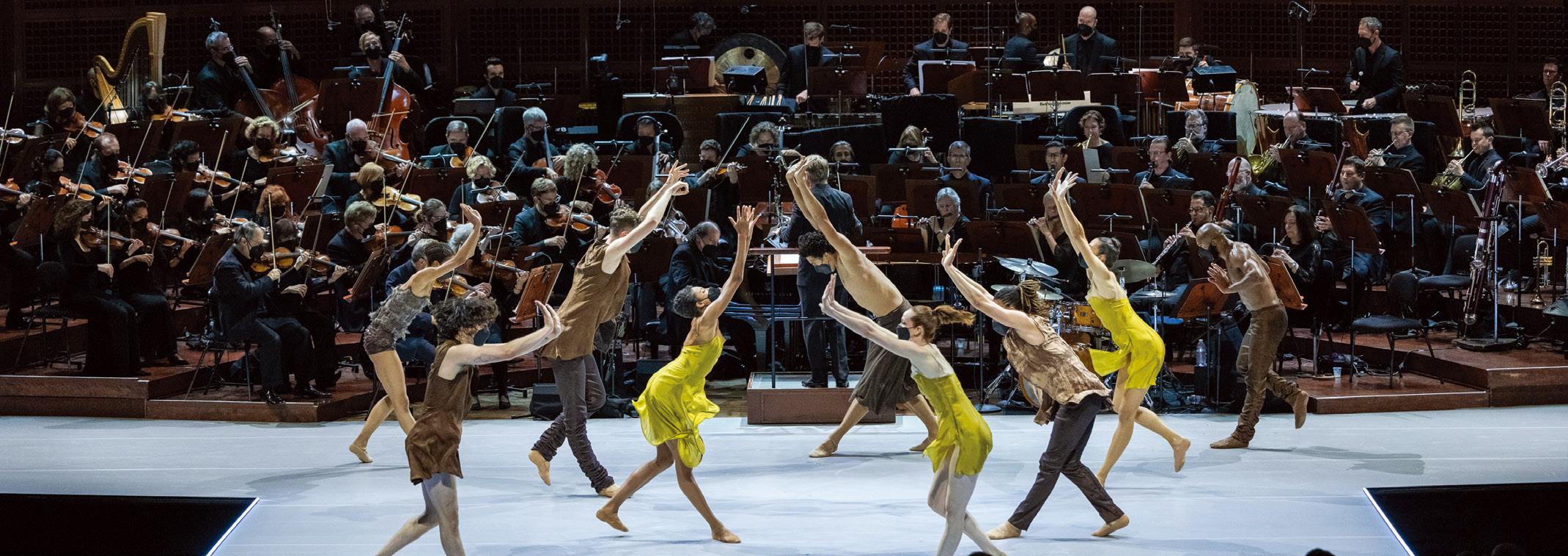
The San Francisco Symphony and dancers from Alonzo King LINES Ballet at the orchestra’s “Re-Opening Night” concert at Davies Symphony Hall, led by Music Director Esa-Pekka Salonen, October 1, 2021.
Re-Opening in San Francisco
On October 1, Esa-Pekka Salonen led the San Francisco Symphony in its first opening-night concert since he became music director last season. Dubbed “Re-Opening Night,” the event at Davies Symphony Hall featured Collaborative Partner Esperanza Spalding and the San Francisco-based contemporary dance company Alonzo King LINES Ballet. The program included John Adams’s Slonimsky’s Earbox; Alberto Ginastera’s Estancia Suite featuring choreography by Alonzo King and dancers from LINES Ballet; and Silvestre Revueltas’s “Noche de encantamiento” from his film score La noche de los Mayas. The concert culminated with singer and bassist Esperanza Spalding performing Wayne Shorter’s Pegasus and excerpts from Gaia with the orchestra. What would opening night be without a party—or parties, in this case? The celebrations, held outdoors due to the pandemic, included a pre-concert welcome on Davies’ outdoor terrace and an after-party on Grove Street. Proof of vaccination against COVID-19 was required in Davies Symphony Hall, and patrons wore face masks during performances. For those who couldn’t attend in person, in November the concert was broadcast on PBS’s Great Performances and streamed on PBS.




